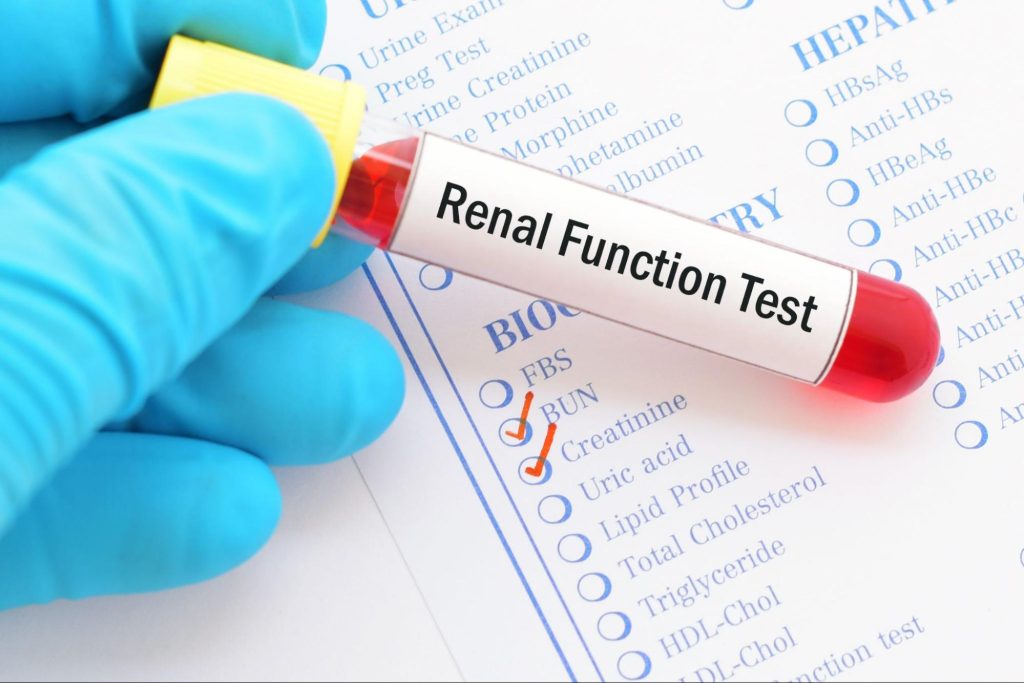Kidney Stones / Urology
Understanding Kidney Function Test (KFT):

by admin
24th August 2023
8 minutes read
The kidneys are two bean-shaped organs that serve an indispensable role in our body. Their main function is to filter blood, remove waste, control the body’s fluid balance, and keep the right levels of electrolytes. Keeping them in good health is crucial, and kidney function tests or KFTs are key to achieving this. Understanding these tests can aid in early detection and prevention of kidney diseases.
What is a Kidney Function Test (KFT)?
A kidney function test, also known as a renal function test, is a collective term for a series of tests used to evaluate how well the kidneys are working. These tests measure and monitor various parameters, such as the levels of certain proteins, electrolytes, glucose, and waste products in the blood and urine.
Types of Kidney Function Tests
There are several types of kidney function tests that doctors may use to assess kidney health. Some of the most common include:
1. Serum Creatinine Test:
Creatinine is a waste product that your muscles produce. Healthy kidneys remove creatinine from your blood. This test measures the amount of creatinine in your blood to estimate your glomerular filtration rate (GFR) the rate at which your kidneys filter waste. High levels of creatinine may indicate kidney disease or impairment.
2. Blood Urea Nitrogen (BUN) Test:
Urea nitrogen is a waste product from the breakdown of protein in the liver. This test measures the amount of urea nitrogen in your blood. Increased BUN levels may suggest impaired kidney function.
3. Estimated Glomerular Filtration Rate (eGFR) Test:
This test estimates how much blood per minute is passing through the tiny filters in your kidneys, called glomeruli. Lower than normal eGFR levels may be a sign of kidney disease.
4. Urine Tests:
Urine tests are part of KFT, which can check for specific proteins, glucose, blood, and white blood cells. Urinalysis can help to detect problems in your urinary system, including your kidneys.
5. Imaging Tests:
These may include ultrasounds or CT scans. These tests help doctors to visualize the kidneys and urinary tract. This is often used in the diagnosis of kidney stones and identifying their types, and planning for any required kidney stone surgery.
KFT: A Critical Tool in Diagnosing Kidney Diseases
Kidney function tests (KFT) are instrumental in diagnosing various types of kidney disease. These include chronic kidney disease (CKD), polycystic kidney disease (PKD), glomerulonephritis, and urinary tract infections, among others. They also play a vital role in identifying and diagnosing the different types of kidney and renal stones, such as calcium, struvite, uric acid, and cystine stones.
Through these tests, doctors can determine the severity of kidney disease, plan for the appropriate treatment, and monitor the efficacy of the treatment given. They also help in predicting outcomes and can be life-saving in situations where urgent medical intervention is required.
The Procedure of Kidney Function Tests
A blood test for kidney function, like any other blood test, involves drawing blood from a vein, usually from the inside of the elbow or the back of the hand. The site is cleaned with antiseptic, and a tourniquet (an elastic band) or blood pressure cuff is placed around the upper arm to apply pressure and cause the vein to swell with blood. A needle is then inserted into the vein, and the blood is collected in an airtight vial or a syringe. After the procedure, the needle is removed, and the puncture site is covered to stop any bleeding. The blood sample is then sent to the lab for analysis.
On the other hand, a urine test for kidney function involves collecting a urine sample in a clean container. The sample is then sent to the lab for testing. In some cases, a 24-hour urine collection may be needed. This involves collecting all urine passed in a 24-hour period, which can provide a more accurate picture of kidney function.
Understanding your KFT Results
Understanding your Kidney Function Test (KFT) results is an essential step in the process of managing your kidney health. Your KFT results can provide important information about how well your kidneys are functioning and whether there may be any underlying issues that need to be addressed.

To interpret your KFT results, it’s essential to understand what the various tests measure:
1. Serum Creatinine:
This measures the amount of creatinine, a waste product from muscle metabolism, in your blood. Normal levels typically range between 0.7 to 1.3 mg/dL in men and 0.6 to 1.1 mg/dL in women. Higher-than-normal levels may suggest your kidneys are not filtering creatinine out of your blood properly, which could be a sign of kidney disease.
2. Blood Urea Nitrogen (BUN):
Urea nitrogen is a waste product from the breakdown of protein in the liver. Normal BUN levels usually range between 7 and 20 mg/dL. Increased BUN levels may indicate impaired kidney function, but can also be influenced by a high-protein diet or dehydration.
3. Estimated Glomerular Filtration Rate (eGFR):
This is an estimate of how much blood per minute your kidneys filter. Normal eGFR for adults is over 90 mL/min. An eGFR below 60 mL/min for three months or more could indicate kidney disease. An eGFR below 15 mL/min is a sign of kidney failure.
4. Urine Tests:
Normal urine should not contain glucose, blood, or high levels of protein. The presence of these substances could indicate kidney damage. Also, the urine’s concentration and acidity can give information about kidney function.
If any of your KFT results fall outside the normal range, it does not necessarily mean you have kidney disease. Many factors can affect kidney function tests, including medications, diet, hydration levels, and physical activity. For example, a diet high in protein can increase your BUN levels, and certain medications can increase your creatinine levels.
Abnormal KFT results often require additional testing to determine the cause. Your doctor may order imaging tests, such as an ultrasound or CT scan, to visually inspect your kidneys for any signs of damage or disease. If necessary, they may also recommend a kidney biopsy, a procedure in which a small piece of kidney tissue is removed and examined under a microscope.
Always discuss your KFT results with your healthcare provider. They can help you understand what your results mean in the context of your overall health and medical history. If you do have kidney disease, understanding your KFT results is an important step in managing the condition and slowing its progression.
Conclusion
In conclusion, kidney function tests are essential tools in maintaining kidney health and diagnosing kidney disease. These tests provide vital information about the overall health of your kidneys, and understanding their purpose and what they entail is a step toward maintaining optimal kidney health. It’s important to note that while these tests can provide valuable insights, they are just part of the overall assessment of kidney health. Regular check-ups with your healthcare provider are crucial, as is leading a lifestyle conducive to good kidney health, including maintaining a balanced diet, staying hydrated, exercising regularly, and avoiding excessive use of medications that may harm the kidneys.
How Can Medfin help?
Medfin is a daycare surgery expert providing access to the latest surgical procedures and top doctors in your city at affordable prices. Medfin provides you access to top doctors and surgeons with 10+ years of experience . With Medfin, you can leave your hassles behind and focus on your health. From instant consultations to paperwork assistance, we have got you covered with everything. So why wait? Call us today!
FAQ’s
Individuals with risk factors for kidney disease, such as diabetes, high blood pressure, family history of kidney problems, or those experiencing symptoms like frequent urination, swelling, or fatigue, should undergo a KFT.
GFR measures the rate at which the kidneys filter waste products from the blood. It helps determine the stage of kidney disease and guides treatment decisions.
Serum Creatinine levels in the KFT results provide an estimate of the kidneys’ ability to filter waste products from the blood. Higher levels may indicate reduced kidney function.
Urine tests can reveal the presence of protein, blood, or other substances, which may indicate kidney damage, infections, or other kidney-related conditions.
The common types of Kidney Function Tests include blood tests like Serum Creatinine, Blood Urea Nitrogen (BUN), and Glomerular Filtration Rate (GFR), as well as urine tests like Urinalysis and Proteinuria assessment.
CATEGORIES
- ACL Reconstruction
- Anal Fissures
- Anal Fistula
- Appendicitis
- ASK A DOCTOR
- Benign Prostatic Hyperplasia
- Breast Lump Excision
- Cataract
- Circumcision
- Conditions & Diseases
- Cosmetology
- Covid-19
- Cure
- Endocrinology
- ENGLISH VIDEOS
- Eye Care
- Gallstones
- General Surgeries
- Government Schemes
- Gynaecology
- Gynecomastia
- Gynecomastia
- Health
- Health Insurance
- Hernia
- hindi
- Hip Arthoscopy
- Hip Replacement
- Hip Replacement Surgery
- Hydrocele
- Kannada
- Kidney Stones
- Knee Arthroscopic
- Laparoscopic
- LASER
- Latest Treatments
- Lifestyle
- Liposuction
- Medfin Stories
- Medicine
- Nephrology
- Ophthalmology
- Orthopaedic
- Paraphimosis
- Patient Testimonials
- PCL Reconstruction
- Phimosis
- Piles (Hemorrhoids)
- Pilonidal Sinus
- Proctology
- Prostate Artery Embolization
- Rhinoplasty
- Second Opinion
- Total Knee Replacement
- Uncategorised
- Urology
- uterine artery embolization
- Uterine Fibroids
- Varicocele
- Varicose Veins
- Vascular
- VIDEOS






